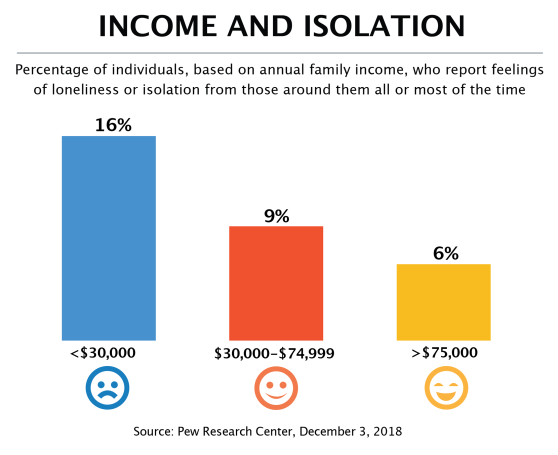How Loneliness Can Affect Your Financial ConditionAccording to a Pew Research Center survey, one in 10 Americans reports feeling lonely or isolated from others all or most of the time. While this number may not sound significant, it is alarming, considering that loneliness can also take a toll on your financial situation. A link between loneliness and dissatisfactionThe Pew survey found that frequent loneliness is linked to dissatisfaction with one's family, social, and community life. People who say they are somewhat or very dissatisfied with their personal financial situations are significantly more likely to feel frequent loneliness than those who are satisfied with their finances (17% vs. 5%). And 14% of people who say they don't have enough income to lead the kind of life they want report feeling lonely or isolated often, compared with just 5% of individuals who have enough income to lead their ideal lives.1 A relationship to financesAlthough the Pew survey did not draw any specific conclusions, it indicated a link between loneliness and satisfaction with one's financial situation, suggesting how frequent loneliness can lead to financial problems. Specifically, loneliness can cause a lack of awareness about major financial issues, as well as an increased vulnerability to fraud. Lonely people have fewer opportunities to discuss  finances with others face-to-face. This makes it easier for scam artists to take advantage of them by faking emotional support while stealing money. Research has also linked loneliness and worsening chronic conditions. One study found that social isolation is associated with an estimated $6.7 billion in additional federal Medicare spending annually. As social isolation increases, chronic illnesses can grow more severe and result in higher medical bills and stress levels. This can have a harsher impact on those trying to cope alone.2 A little less lonelyFortunately, there are ways to fight against loneliness and its effect on your financial condition. Start by expanding your social circle. Seek volunteer opportunities that will introduce you to new people as well as help you give back to your community. Establish routines that will keep you busy and develop healthy habits that don't cost money, such as spending time outdoors, joining a weekly group, reading, and meditating. Consider seeking guidance from a medical professional who may be able to connect you with local resources to integrate more social engagement into your life. 1 Pew Research Center, December 3, 2018 2 AARP, "Medicare Spends More on Socially Isolated Older Adults," November 2017
| ||
According to the Pew survey, people who say they are somewhat or very dissatisfied with their personal financial situations are significantly more likely to feel frequent loneliness than those who are satisfied with their finances (17% versus 5%). |
IMPORTANT DISCLOSURES
Broadridge Investor Communication Solutions, Inc. does not provide investment, tax, or legal advice. The information presented here is not specific to any individual's personal circumstances.
To the extent that this material concerns tax matters, it is not intended or written to be used, and cannot be used, by a taxpayer for the purpose of avoiding penalties that may be imposed by law. Each taxpayer should seek independent advice from a tax professional based on his or her individual circumstances.
These materials are provided for general information and educational purposes based upon publicly available information from sources believed to be reliable--we cannot assure the accuracy or completeness of these materials. The information in these materials may change at any time and without notice.
Copyright 2025 by Broadridge Investor Communication Solutions Inc.All Rights Reserved.